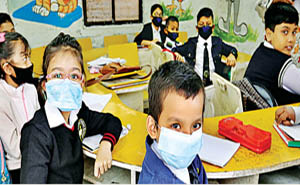Says Unicef, Unesco report
 The education of 37 million children in Bangladesh has been disrupted due to school closures since the start of the COVID-19 pandemic in early 2020, according to a report of Unicef and Unesco.
The education of 37 million children in Bangladesh has been disrupted due to school closures since the start of the COVID-19 pandemic in early 2020, according to a report of Unicef and Unesco.
The report titled ‘Situation Analysis on the Effects and Responses to Covid-19 on the Education Sector in Asia’ (SitAn Report) was released on Tuesday.
According to the report, the pandemic has affected about 800 million children in Asia, including South Asia, Southeast Asia and East Asia.
The report highlights the continued impact of the pandemic on children’s education and features various regional government’s programmes and initiatives to respond to it.
The report urged the governments to reopen schools soon as it is safe to do so.
The associated consequences of such continuous school closures are staggering and include learning loss; mental distress; missed school meals and routine vaccinations; heightened risk of dropout of structured education; increased, child labour; and increased child marriage, the report mentioned..
“Many of these dire consequences are already affecting countless children, and many will continue to be felt in the years to come,” it said.
“We cannot overlook the impact that the disruption of education services has had on children, particularly the most vulnerable. When schools remain closed, children miss out on the biggest opportunity to learn and develop to their full potential. The future of an entire generation is at stake; therefore, we need every effort
to ensure a safe reopening of schools as soon as possible. Otherwise, the learning loss will be difficult to overcome,” stated Marcoluigi Corsi, UNICEF regional director for East Asia and Pacific.
While countries across Asia are taking actions to provide students with distance learning, a Unicef-supported study by the Campaign for Popular Education (CAMPE) showed that two out of three pre-primary to upper secondary students in Bangladesh were not reached through remote education during pandemic school
closures.
The report called on governments and partners to strengthen teaching and teacher support, so as to address current low levels of learning and help narrow the learning divide, and protect and preserve education funding.
“With schools now open in Bangladesh after an 18-month closure, we must spare no effort to rapidly put in place mechanisms that help children catch-up, keeping a particular focus on the most disadvantaged children. Now is the time to invest, to strengthen the education system, and to bridge digital inequalities,” said
Sheldon Yett, Unicef representative to Bangladesh.
“Governments, partners and the private sector will need to work together, not only to get the strategies and levels of investment right, but to build more resilient, effective and inclusive systems that are able to deliver on the promise of education as a fundamental human right for all children, whether schools are open or closed,” said George Laryea-Adjei, Unicef regional director for South Asia.
Image : Collected




















